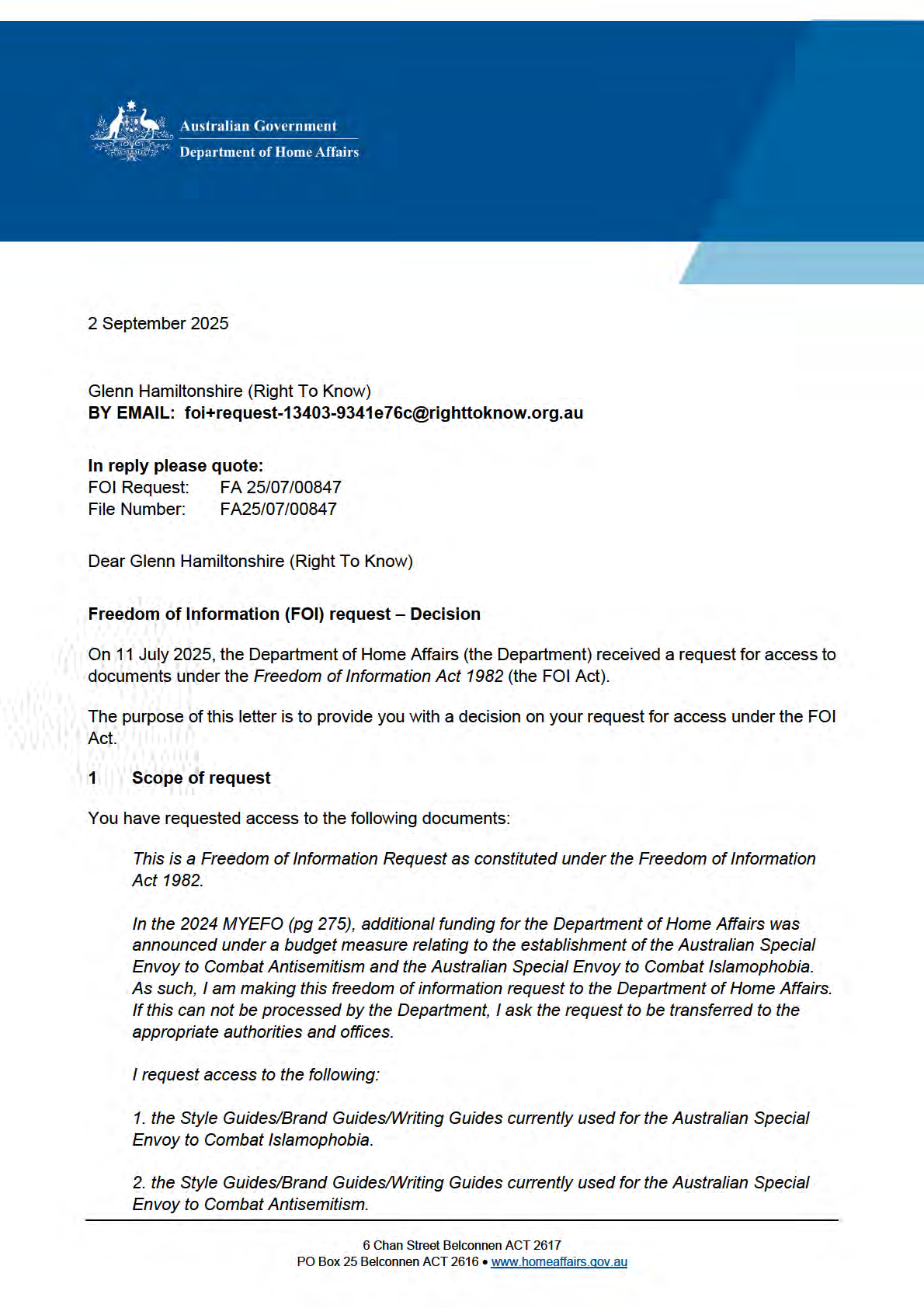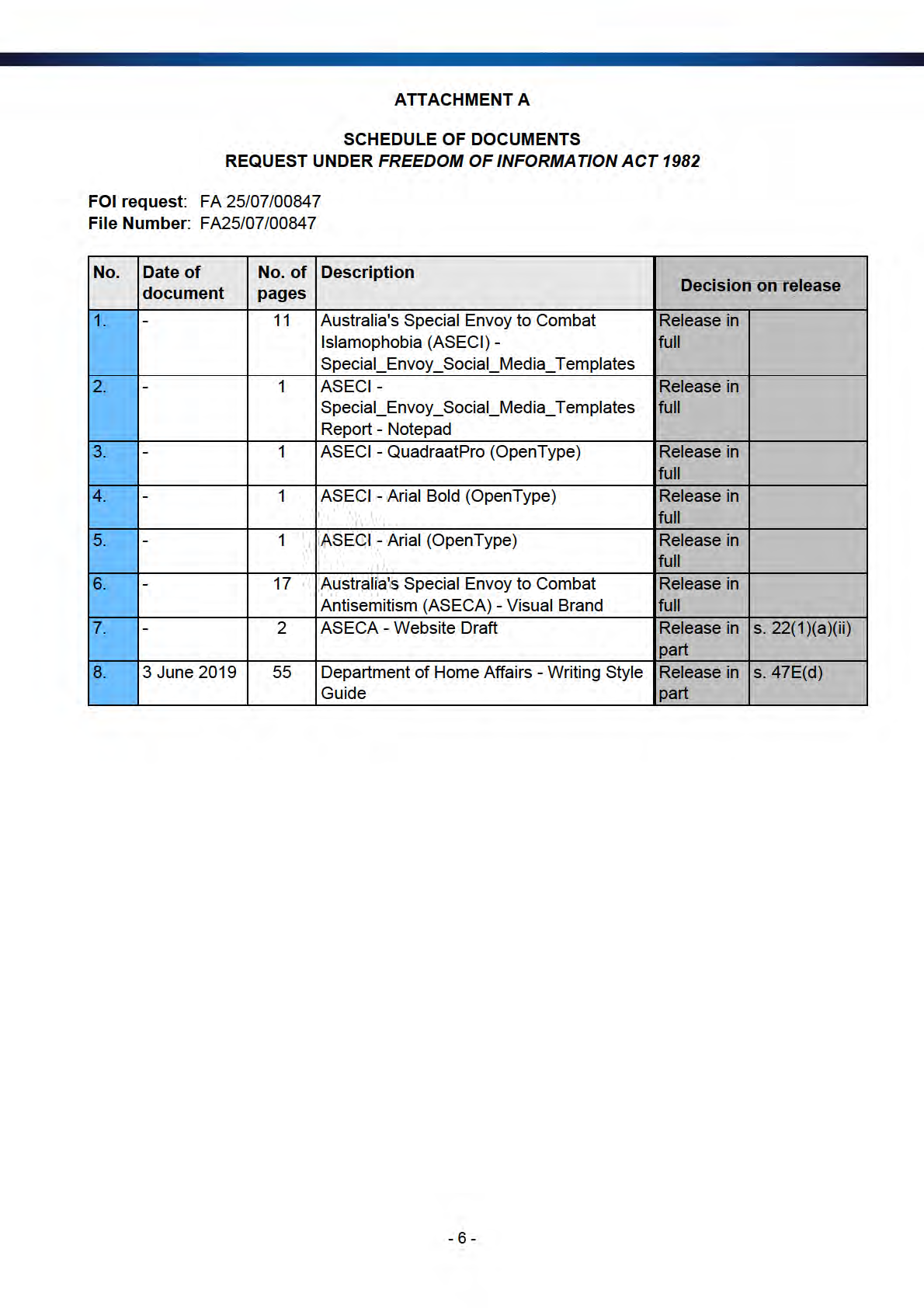
 2
Authority to make decision
2
Authority to make decision
I am an officer authorised under section 23 of the FOI Act to make decisions in respect of requests
to access documents or to amend or annotate records.
3
Relevant material
In reaching my decision I referred to the following:
•
the terms of your request
•
the documents relevant to the request
•
the FOI Act
•
Guidelines published by the Office of the Information Commissioner under section 93A
of the FOI Act (the FOI Guidelines)
•
advice from Departmental officers with responsibility for matters relating to the
documents to which you sought access
4
Documents in scope of request
The Department has identified eight documents as falling within the scope of your request. These
documents were in the possession of the Department on 11 July 2025 when your request was
received.
Attachment A is a schedule which describes the relevant documents and sets out my decision in
relation to each of them.
5
Decision
The decision in relation to the documents in the possession of the Department which fall within the
scope of your request is as follows:
•
Release six documents in full
•
Release two documents in part with deletions
6
Reasons for Decision
Detailed reasons for my decision are set out below.
6.1 Section 22 of the FOI Act – irrelevant to request
Section 22 of the FOI Act provides that if giving access to a document would disclose information
that would reasonably be regarded as irrelevant to the request, it is possible for the Department to
prepare an edited copy of the document, modified by deletions, ensuring that the edited copy would
not disclose any information that would reasonably be regarded as irrelevant to the request.
I have decided that parts of Document 7 marked
‘s22(1)(a)(ii)’ would disclose information that could
reasonably be regarded as irrelevant to your request. I have prepared an edited copy of the
document, with the irrelevant material deleted pursuant to section 22(1)(a)(ii) of the FOI Act.
The remainder of the document has been considered for release to you as it is relevant to your
request.
- 2 -
 6.2 Section 47E of the FOI Act – Operations of Agencies
6.2 Section 47E of the FOI Act – Operations of Agencies
Section 47E(d) of the FOI Act provides that documents are conditionally exempt if disclosure would,
or could reasonably be expected to, have a substantial adverse effect on the proper and efficient
conduct of the operations of an agency.
I consider that the disclosure of the parts of the document marked ‘
s47E(d)’ would, or could
reasonably be expected to, have a substantial adverse effect on the proper and efficient conduct of
the operations of the Department.
Information marked
's47E(d)' consists of operational email addresses used by this Department.
These email addresses are not otherwise publicly available, and disclosure of this information could
reasonably be expected to result in potential vexatious communication and public inquiries which
these operational areas are not resourced to manage. The Department has established channels
of communication for members of the public into the Department, and I consider there is no public
interest in disclosing these operational contact details. Given the operational focus of those business
areas, such a diversion of the resources of that business area could reasonably be expected to have
a substantial adverse effect on the proper and efficient conduct of the operations of this Department
and its partner agencies.
I have decided that parts of the documents are conditionally exempt under section 47E(d) of the FOI
Act. Access to a conditionally exempt document must generally be given unless it would be contrary
to the public interest to do so. I have turned my mind to whether disclosure of the information would
be contrary to the public interest, and have included my reasoning in that regard below.
6.3 The public interest – section 11A of the FOI Act
As I have decided that parts of the documents are conditionally exempt, I am now required to
consider whether access to the conditionally exempt information would be contrary to the public
interest (section 11A of the FOI Act).
A part of a document which is conditionally exempt must also meet the public interest test in section
11A(5) before an exemption may be claimed in respect of that part.
In summary, the test is whether access to the conditionally exempt part of the document would be,
on balance, contrary to the public interest.
In applying this test, I have noted the objects of the FOI Act and the importance of the other factors
listed in section 11B(3) of the FOI Act, being whether access to the document would do any of the
following:
(a)
promote the objects of this Act (including all the matters set out in sections 3 and 3A)
(b)
inform debate on a matter of public importance
(c)
promote effective oversight of public expenditure
(d)
allow a person to access his or her own personal information.
Having regard to the above I am satisfied that:
•
Access to the documents would promote the objects of the FOI Act.
•
The subject matter of the documents does not seem to have a general characteristic of
public importance. The matter has a limited scope and, in my view, would be of interest
to a very narrow section of the public.
- 3 -

•
No insights into public expenditure will be provided through examination of the
documents.
•
You do not require access to the documents in order to access your own personal
information.
I have also considered the following factors that weigh against the release of the conditionally exempt
information in the documents:
•
Disclosure of the operational email addresses which are conditionally exempt under
section 47E(d) of the FOI Act would have a substantial adverse effect on the ability of
the relevant operational areas to conduct their business as usual. The Department has
established avenues in place for members of the public to contact when they have
queries, complaints or comments. I consider that there is a strong public interest in
ensuring public feedback is filtered through these available channels so that operational
areas within the Department are able to carry out their functions in an effective matter. I
consider that this would be contrary to the public interest and that this factor weighs
strongly against disclosure of the exempt information.
I have also had regard to section 11B(4) which sets out the factors which are irrelevant to my
decision, which are:
a)
access to the document could result in embarrassment to the Commonwealth
Government, or cause a loss of confidence in the Commonwealth Government
b)
access to the document could result in any person misinterpreting or misunderstanding
the document
c)
the author of the document was (or is) of high seniority in the agency to which the request
for access to the document was made
d)
access to the document could result in confusion or unnecessary debate.
I have not taken into account any of those factors in this decision.
Upon balancing all of the above relevant public interest considerations, I have concluded that the
disclosure of the conditionally exempt information in the documents would be contrary to the public
interest and it is therefore exempt from disclosure under the FOI Act.
7
Legislation
A copy of the FOI Act is available at https://www.legislation.gov.au/Series/C2004A02562. If you are
unable to access the legislation through this website, please contact our office for a copy.
8
Your review rights
If you disagree with this decision, you have the right to apply for either an internal review or an
Information Commissioner review of the decision.
Internal review
If you want the Department to review this decision, you must make your internal review request
within 30 days of being notified of this decision.
When making your internal review request, please provide the Department with the reasons why you
consider this decision should be changed.
- 4 -

You can send your internal review request to:
Email: xxx.xxxxxxx@xxxxxxxxxxx.xxx.xx
The internal review will be carried out by an officer who is more senior than the original decision
maker. The Department must make its decision on the review within 30 days of receiving your
request for internal review.
Information Commissioner review
If you want the Australian Information Commissioner to review this decision, you must make your
request to the Office of the Australian Information Commissioner (OAIC) within 60 days of being
notified of this decision.
You can apply for an Information Commissioner review using the
Information Commissioner review
application form on the OAIC website.
You can find more information about Information Commissioner reviews
on the OAIC website.
9
Making a complaint
You may make a complaint to the Australian Information Commissioner if you have concerns about
how the Department has handled your request under the FOI Act. This is a separate process to the
process of requesting a review of the decision as indicated above.
You can make an FOI complaint to the Office of the Australian Information Commissioner (OAIC)
at
: FOI Complaint Form on the OAIC website.
10
Contacting the FOI Section
Should you wish to discuss this decision, please do not hesitate to contact the FOI Section at
xxx@xxxxxxxxxxx.xxx.xx.
Yours sincerely
Electronically signed
Malcolm
Position number: 60195675
Authorised Decision Maker
Department of Home Affairs
- 5 -






